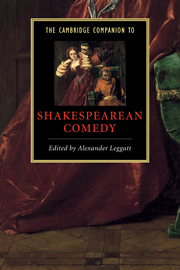Book contents
9 - Comedy and sex
from Part 2 - Shakespearean comedy
Published online by Cambridge University Press: 28 May 2006
Summary
In the opening scene of The Two Gentlemen of Verona the title characters have an abstract, literary debate about love, introducing their ideas with the formula “writers say” (1.1.43, 46).1 The principal lovers at the beginning of the play are Proteus and Julia, who communicate by letter and whom we never see together until Act 2 scene 2, when they are forced to part. Love seems a matter of words, disembodied and unfulfilled, all theory and no practice. In Act 2 scene 5, however, Launce, the play's principal clown, gives a different view of it. When his colleague Speed asks about Proteus and Julia, “how stands the matter with them?” Launce replies, “Marry, thus: when it stands well with him, it stands well with her” (19-21). In our era, sex has been as relentlessly theorized as any human activity. For Shakespeare's clowns it is a simple, practical matter. There is nothing to debate, though there may be something to illustrate: elsewhere in the scene Launce uses his staff as a comic prop; he could use it here.
Launce’s name, a variant spelling of “lance,” makes this sort of comedy appropriate to him. Moreover, he is accompanied in his major scenes by his dog Crab. It is not just that sex brings out the animal in humanity, though Shakespeare uses that idea elsewhere: Falstaff appears for his final encounter with the wives of Windsor as a stag at rutting-time, and in Cymbeline Posthumus imagines that Jachimo in bed with Imogen “Like a full-acorned boar . . . / Cried ‘O!’ and mounted” (2.5.16–17).
- Type
- Chapter
- Information
- The Cambridge Companion to Shakespearean Comedy , pp. 139 - 155Publisher: Cambridge University PressPrint publication year: 2001



